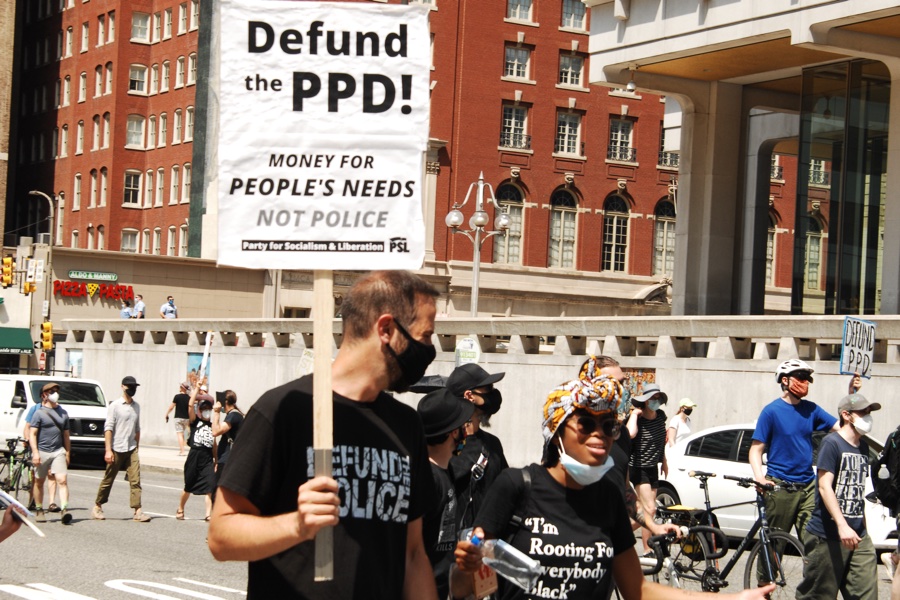Philly’s New Budget Makes It Clear City Hall Will Never Defund the Police
If there was ever a moment to get serious about defunding our police department, this would have been it. Instead, we gave the people responsible for last year's tear-gassing what amounts to a raise.

Thousands of protesters took to the streets to demand that the city defund the police on July 5, 2020. (Photo by Cory Clark/NurPhoto via Getty Images)
As the saying goes, “Don’t believe the hype,” especially when it comes to the Philly police budget.
After all that talk of criminal justice reform from elected officials following last summer’s racial uprisings, the city’s newly approved budget actually increases police spending.
City budget talks are messy, confusing, and misleading to the public. There are often bold declarations from politicians about what they propose to do with taxpayer dollars — only for things to change within a matter of days. Last year, when the defunding debate was at its peak, City Councilmembers were touting how they were reducing the police department’s budget by $33 million (which wasn’t really what happened). This year they reshifted the focus onto anti-violence prevention rather than continuing to push on the police budget. It’s important to note that reducing the police department’s budget number isn’t the same as actually reducing police spending in total. It would appear, when you look at the budget, that police funding didn’t rise from last year. But look more closely: Just as we saw last year, when the cancellation of a proposed increase and the shuffling of some police functions to another budget line was packaged as a “cut,” there are ways to move funding for police functions to other city departments/initiatives that make it look like we’re spending less on police but that don’t actually reduce the department’s influence.
Just for example, within the city’s new anti-violence spending plan, $13 million will be going toward a 911 mental health response program and mobile crisis team — which will rely on law-enforcement involvement.
What’s intellectually dishonest about City Council’s current boast about anti-violence advocacy funding is that they’re not being as up-front about moving millions of additional dollars that would have gone to police department to the managing director’s office — just as the city tried to spin a story about new money going toward anti-gun-violence efforts when much of that “increase” was just a reclassification of pre-existing funds. The city wasn’t slick when it decided to reallocate $5.4 million to the managing director’s office to bolster the police department’s Office of Forensic Science and move $787,000 to the city’s Office of Innovation and Technology to boost the use of forensic data in criminal investigations.
If such a lack of transparency sounds familiar, that’s because it is. We’ve been bamboozled into thinking fiscal progress on police spending was coming when it isn’t.
Last year, headlines spoke of the police budget being flattened, even though it would later be increased by $18 million for overtime expenses connected to the protests. At the time, some on City Council scrutinized the $727 million police budget — the largest expense on the city’s overall budget — and called for more accountability and oversight.
“I cannot accept a budget that allowed the Philadelphia Police Department to make up 15 percent of the total operating budget when they have failed to historically make our communities safer,” Councilmember-at-large Kendra Brooks told the Inquirer last June, when she was one of three members (with Republicans David Oh and Brian O’Neill) who voted against last year’s budget. “Displays of excessive force against protesters, hostility toward journalists, and rallies behind violent vigilante groups have further called into question whether the PPD’s budget is justified.”
“Institutional racism doesn’t get eradicated by one city budget,” Councilmember Jamie Gauthier, who voted in favor of last year’s budget, told the press in June 2020. “Achieving true racial justice in our city is going to require difficult conversations and intensive policy change.” Both Brooks and Gauthier voted aye on this year’s disappointing budget, with Councilmember Oh the lone dissenter this time.
But everyone knows that you can tell an administration’s priorities by what it puts its money behind. If you think the police department perpetuates institutional racism, you don’t keep stuffing its coffers to allow it to keep doing the same problematic shit over and over again. The city is now looking at paying out thousands of dollars in settlements and continues to face lawsuits after the police wrongfully tear-gassed innocent protesters and civilians during last summer’s racial uprisings. The situation was so embarrassing and chaotic that even the United Nations called out the city.
For City Hall to increase police funding, whether indirectly or not, is a slap to all of those who held peaceful protests, town halls and rallies over the past year. The people did their part at the voting booth and in their communities to make calls for more police accountability a priority. While the new budget does fund some reforms (such as a new police oversight board), they mean nothing when the problematic institution isn’t held accountable when it comes to funding.
If there was ever a time to actually defund the police department — by which I mean decrease its spending across the board — this year would have been it. There was enough public angst and pressure from activists and the community alike to see a genuine reduction. Now, as public interest in such measures begins to wane, it looks like Philly politics as usual will win the day.
What a damn shame, given all of the “progressive” City Council members who once made us feel that real change was on the way.


